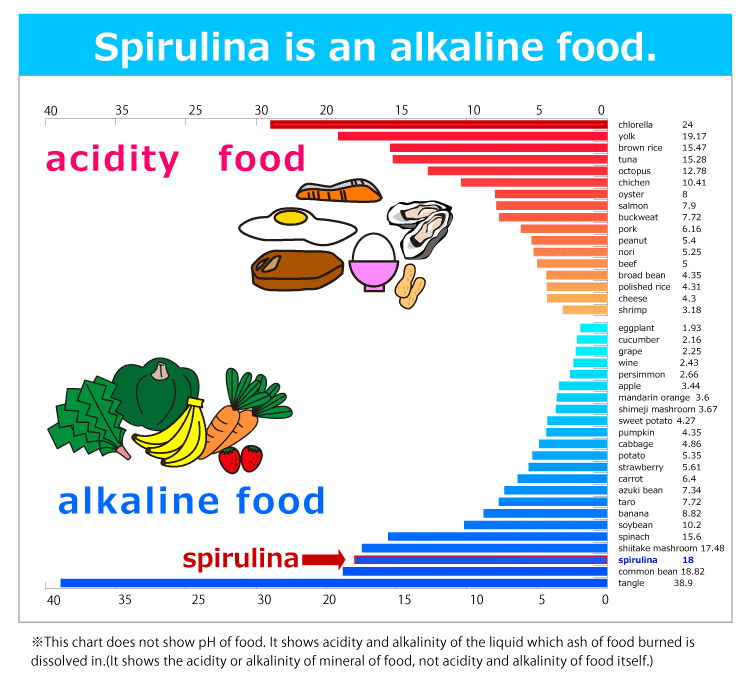 Home
Home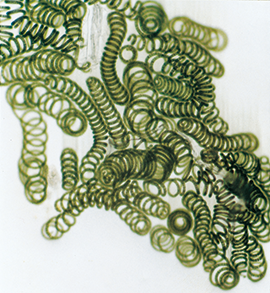
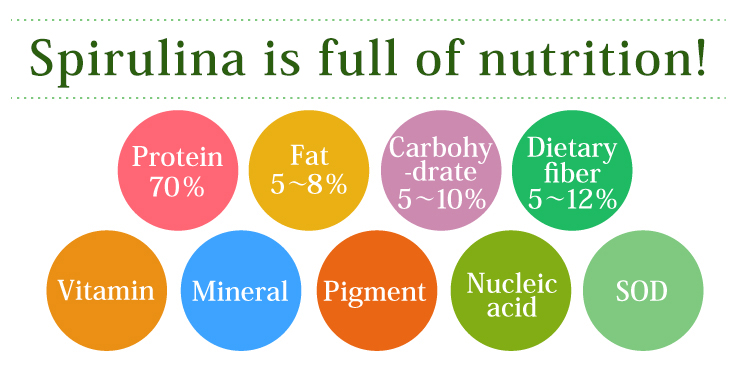
Isoleucine, Leucine, Lysine, Methionine, Cystine, Tyrosine, Phenylalanine, Threonine, Tryptophan, Valine, Histidine, Arginine, Alanine, Aspartic acid, Glutamic acid, Glycine, Proline, Serine
Calcium, Iron, Magnesium, Potassium, Sodium, Phosphorus, Copper, Manganese, Zinc, Cobalt, Sulfur, Chromium
β-carotene(Pro-vitamin A), Vitamin B1, Vitamin B2, Vitamin B6, Vitamin E, Vitamin K, Niacin, Pantothenic acid, Biotin, Folic acid
Dietary fiber, Polysaccharide, Linoleic acid, γ-linolenic acid, Inositol, SOD, Phycocyanin, Zeaxanthin, Chlorophyll a, Nucleic acid etc.
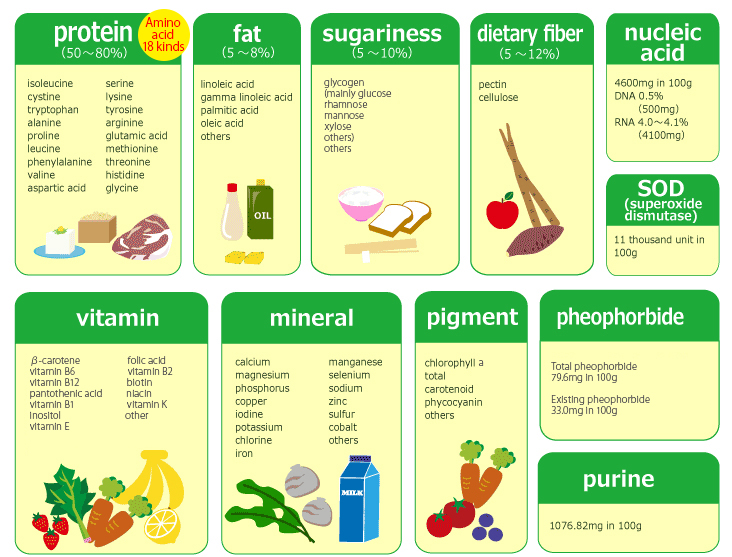
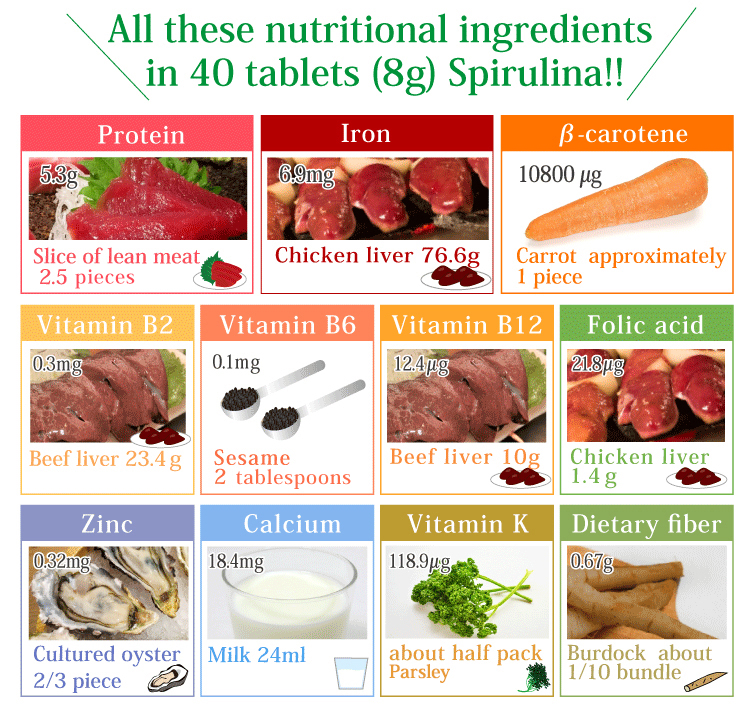
Spirulina covers all these nutrients at once, making it perfect healthy multi-supplement for busy modern people.
| Calorie | 260~390kcal |
|---|---|
| Protein | 51.7~80g |
| Fat | 6.7~8.3g |
| Sugariness | 3.3~5g |
| Dietary fiber | 6.7~10g |
| Sodium | 433.3~650mg |
| Calcium | 263.3~495mg |
| Iron | 61.7~115mg |
| Potassium | 1050~1800mg |
| Magnesium | 200~383.3mg |
| Zinc | 3.3~6.7mg |
| Copper | 0.3~0.8mg |
| Manganese | 1.5~8mg |
| Selenium | 5~10μg |
| Cobalt | 0~0ppm |
| Phosphorus | 550~1400mg |
| Total chrome | 0.5~3.3ppm |
| Iodine | 0~1.7mg |
| β- carotene | 80000~200000μg |
| Vitamin B1 | 2.2~4.8mg |
| Vitamin B2 | 2.2~4.8mg |
|---|---|
| Vitamin B6 | 0.7~1.3mg |
| Vitamin B12 | 183.3~400μg |
| Vitamin E | 6.3~12mg |
| Niacin | 11.7~20mg |
| Folic acid | 133.3~300μg |
| Pantothenic acid | 0.8~1.8mg |
| Biotin | 20~45μg |
| Vitamin K1 | 1033.3~1933.3μg |
| Vitamin K2 | 16.7~133.3μg |
| Inositol | 65~140mg |
| γ-linolenic acid | 900~1833.3mg |
| Linoleic acid | 833.3~1666.7mg |
| Total carotenoid | 200~450mg |
| Phycocyanin | 3000~9000mg |
| Chlorophyll a | 600~1250mg |
| Nucleic acid(RNA) | 2200~3500mg |
| Nucleic acid(DNA) | 600~1000mg |
The nutrient content of Spirulina varies slightly depending on the season, weather, sunshine hours during the cultivation of Spirulina.
Besides proteins, sugariness, fatty acids, and vitamins, it also contains plenty of minerals, such as calcium, magnesium, iron and zinc which tend to be deficient in daily diet. Spirulina contains all 5 major nutrients. Furthermore, as it is good for digestion and absorption, these components are smoothly absorbed by the body.
Every part of our body is made of protein. Spirulina contains three times as much protein as beef and twice as much as soybean.
| Spirulina | Soy bean | Beef | Egg | Fish | |
|---|---|---|---|---|---|
| Protein | 65~70% | 35.3% | 19.7% | 12.3% | 24.5% |
Calculated from Fifth revised Food Composition Ingredient Table
※The numbers may differ slightly from the materials you have. (The numbers on this website are newer than the data you have, calculated from the 5th revised food composition table.)
Moreover, Spirulina protein is a high-quality protein that contains essential amino acids in a balanced manner. This quality meets the ideal standard of FAO(United Nations Food and Agriculture Organization).
Protein (amino acid) is an important nutrient which is a kind of raw material used to build cells, enzymes, hormones of our body. Spirulina contains about 70% of high-quality protein, that is 18 types of amino acid including essential amino acids and nonessential amino acids.
| Spirulina | Chlorella | Soy bean | Beef | Egg | Fish | FAO standard | |
|---|---|---|---|---|---|---|---|
| Isoleucine | 3.25~3.9% | 5.5% | 1.80% | 0.93% | 0.67% | 0.83% | 4.2% |
| Leucine | 5.9~6.5% | 7.7% | 2.70% | 1.70% | 1.08% | 1.28% | 4.8% |
| lysine | 2.6~3.3% | 5.7% | 2.58% | 1.76% | 0.89% | 1.95% | 4.2% |
| Methionine | 1.3~2.0% | 1.5% | 0.43% | 0.43% | 0.43% | 0.58% | 12.2% |
| Cystine | 0.5~0.7% | 0.4% | 0.48% | 0.23% | 0.35% | 0.38% | 4.2% |
| Phenylalanine | 2.6~3.3% | 4.1% | 1.98% | 0.86% | 0.65% | 0.61% | 2.8% |
| Tyrosine | 2.6~3.3% | 1.5% | 1.38% | 0.68% | 0.49% | 0.61% | - |
| Threonine | 3.0~3.6% | 4.3% | 1.62% | 0.86% | 0.59% | 0.99% | 2.8% |
| Tryptophan | 1.0~1.6% | 1.1% | 0.55% | 0.25% | 0.20% | 0.30% | 1.4% |
| Valine | 4.0~4.6% | 4.9% | 1.86% | 1.05% | 0.83% | 1.02% | 4.2% |
Body Lubrication! Support Circulation
Spirulina contains abundant natural pigments such as green chlorophyll, blue phycocyanin, orange or yellow carotenoid.
Chlorophyll is a notable ingredient that is useful not only for supporting body circulation, but also care for tired body and hangover.
Spirulina contains beta-carotene and zeaxanthin as carotenoids and these natural pigments play a very important role in reviewing an unhealthy dietary habit.
Although it seems that vitamin is contained in vegetables, vitamin B12 is rarely contained in vegetables but abundant in animal-derived food. Spirulina is algae nevertheless it contains more vitamin B12 than liver and oyster.
The standard amount of carotene is 5 to 15mg per person per day, that means taking 200g of green-yellow vegetables and 100g of light-colored vegetables in a total of 300g! Only the required amount of beta-carotene is converted into vitamin A in the body. Lacking in vitamin A will make your body more prone to daily health problems, so let’s use spirulina which contains plenty of beta-carotene, that is gradually converted to vitamin A in the body only during the daytime, to revise fragile dietary life.
Excessive fat on the body, which is even took up on TV in recent years. Spirulina is rich in linoleic acid and gamma linolenic acid, which cleanse the annoyances that can cause poor circulation and bad health. In particular, these two components cannot be made by the body, so they must be supplemented on a regular basis.
Spirulina, an alkaline food, is a strong ally for people who often eat processed foods and high-fat foods!
In order to keep healthy every day, it is necessary to take alkaline foods and acidic foods in a well-balanced manner, but the dietary habits of modern people who live in hectic lifestyle, tend to be biased toward acidic foods.
Spirulina also supports the diet of such people.
